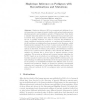Free Online Productivity Tools
i2Speak
i2Symbol
i2OCR
iTex2Img
iWeb2Print
iWeb2Shot
i2Type
iPdf2Split
iPdf2Merge
i2Bopomofo
i2Arabic
i2Style
i2Image
i2PDF
iLatex2Rtf
Sci2ools
142
click to vote
WABI
2010
Springer
2010
Springer
Haplotype Inference on Pedigrees with Recombinations and Mutations
Abstract. Haplotype Inference (HI) is a computational challenge of crucial importance in a range of genetic studies, such as functional genomics, pharmacogenetics and population genetics. Pedigrees have been shown a valuable data that allows us to infer haplotypes from genotypes more accurately than population data, since Mendelian inheritance restricts the set of possible solutions. In order to overcome the limitations of classic statistical haplotyping methods, a combinatorial formulation of the HI problem on pedigrees has been proposed in the literature, called Minimum-Recombinant Haplotype Configuration (MRHC) problem, that allows a single type of genetic variation events, namely recombinations. In this work, we define a new problem, called Minimum-Change Haplotype Configuration (MCHC), that extends the MRHC formulation by allowing also a second type of natural variation events: mutations. We propose an efficient and accurate heuristic algorithm for MCHC based on an L-reduction to...
| Added | 31 Jan 2011 |
| Updated | 31 Jan 2011 |
| Type | Journal |
| Year | 2010 |
| Where | WABI |
| Authors | Yuri Pirola, Paola Bonizzoni, Tao Jiang |
Comments (0)

